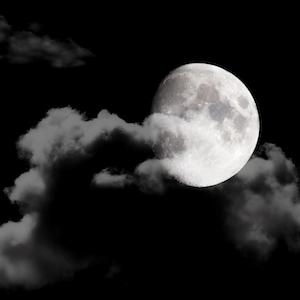Urban legend suggests that full moons cause weird things. It's not as far-fetched as one might think.
While the widespread belief that emergency rooms experience a surge in patients during a full moon is probably hokum, other aspects of the urban legend are not. Some animal behavior, for example, is definitely influenced by the lunar cycle. Could the same be true of humans? According to a recently published case study in Translational Psychiatry, the answer is yes.
The author observed the behavior of a 51-year-old man with bipolar disorder. Patients with bipolar disorder experience manic-depressive cycles. The depressive cycles resemble those of patients suffering from severe depression, while during manic cycles, patients are hyperactive.  Sleep patterns are abnormal, with patients sleeping too much during depressive episodes and not enough during manic episodes. In a sort of vicious cycle, disturbances in sleep pattern appear to be both a cause and effect of manic-depressive episodes.
Sleep patterns are abnormal, with patients sleeping too much during depressive episodes and not enough during manic episodes. In a sort of vicious cycle, disturbances in sleep pattern appear to be both a cause and effect of manic-depressive episodes.
Sleep is governed by the circadian rhythm (an internal biological clock) that is typically entrained to the 24-hour solar day. As the sun goes up and down, the human body's metabolism responds accordingly. But the circadian rhythm in this study's patient also appeared to rise and fall with the tides; in other words, it was entrained not only to the solar day but to the 24.8-hour lunar cycle.
 Figure 1 depicts the patient's sleeping pattern (white = asleep) when he followed his normal routine, according to the typical 24-hour day (on left) and the 24.8-hour lunar day (on right). Under these conditions, the solar signal (which influenced what time he went to sleep) was stronger than the lunar one (which influenced what time he awoke), but both signals are present in the patient's sleep pattern. Each new moon, which occurs roughly every 29.5 days, the patient experienced insomnia and a concomitant shift from depression to mania.
Figure 1 depicts the patient's sleeping pattern (white = asleep) when he followed his normal routine, according to the typical 24-hour day (on left) and the 24.8-hour lunar day (on right). Under these conditions, the solar signal (which influenced what time he went to sleep) was stronger than the lunar one (which influenced what time he awoke), but both signals are present in the patient's sleep pattern. Each new moon, which occurs roughly every 29.5 days, the patient experienced insomnia and a concomitant shift from depression to mania.
When the patient was told to do whatever he wanted (instead of adhering to his normal routine), the solar (sleep-onset) and lunar (wake-onset) signals were equal. Amazingly, when the patient adhered to rigidly scheduled dark periods (Figure 3), his manic-depressive mood cycles stopped.
Taken together, the author concluded that both the solar and lunar cycles were responsible for triggering this bipolar patient's mood cycles. His concluding statement is a thing of scientific beauty:
"Although skepticism is warranted, lunar mood cycles may be an experiment of nature that is pointing toward aspects of gravity and biophysics that are only beginning to be investigated."
Source: Thomas A. Wehr. "Bipolar mood cycles associated with lunar entrainment of a circadian rhythm." Translational Psychiatry 8, Article number: 151. Published: 13 August 2018. doi: 10.1038/s41398-018-0203-x




